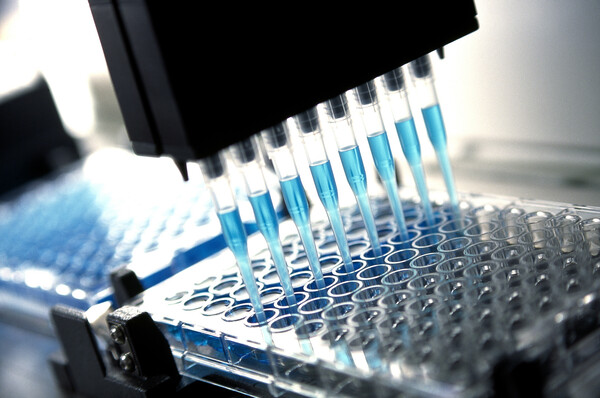The announcement last month of top-line results from Arvinas and Pfizer's phase 3 trial of a targeted protein degradation (TPD) therapy in breast cancer disappointed many in the TPD development field. However, this does not signal the end of TPD technology.
Global pharmaceutical companies continue to focus on the potential of TPD technology, accelerating the development of antibody-degrader-antibody conjugates (DACs) that integrate TPD technology into antibody drug conjugates (ADCs). Korean pharmaceutical and biotech companies have also joined this emerging trend in new drug development.

Arvinas phase 3 flops on primary endpointt; Orum inks licensing deal with DAC tech
The top-line results from Arvinas' phase 3 VERITAC-2 trial of its TPD-based breast cancer drug, vepdegestrant, failed to show statistically significant progression-free survival (PFS) in the intent-to-treat (ITT) population. However, Arvinas plans to continue targeted development of vepdegestrant in specific patient populations, as it showed a significant PFS improvement in patients with ESR1 mutations.
While many observers had hoped for a new blockbuster in TPD, similar to the success of ADCs like Enhertu, some expressed skepticism about the potential for blockbusters in the TPD space after Arvinas' phase 3 results.
However, with over 20 TPD-related clinical trials underway by global pharmaceutical companies, it remains too early to predict the future success of TPD drugs.
Pfizer, Novartis, Sanofi, BMS, Amgen, Novo Nordisk, and other global pharmaceutical companies have integrated TPD technology into their biotech pipelines or conducted joint research, actively developing new drugs.
BMS made waves in Korea by acquiring ORM-6151 from Korean biotech company Orum Therapeutics in November 2023. ORM-6151 utilizes DAC technology, further highlighting the growing interest in TPD-based therapies.
In addition, companies with TPD technology are actively pursuing a strategy to expand their ADCs, which have already proven their potential by successfully developing new drugs, into DACs that incorporate TPD. In Korea, Nurix Therapeutics is taking active steps to expand DACs.
A researcher in the Korean TPD development industry said, "The phase 3 results of Arvinas are a normal process for new science to be recognized by the market, and clinical trials of TPD need more work to find the optimal patient group."
By selecting the right target and patient group, TPD will be highly utilized not only in the field of cancer, but also in autoimmune and degenerative brain diseases, the researcher added.
SK biopharma acquires TPD biotech; Yuhan, Daewoong, Dong-A ST work with biotechs
Major pharmaceutical and biotech companies are moving quickly to secure TPD technology.
For example, in June 2023, SK biopharmaceuticals acquired a 60 percent stake in TPD company Proteovant Sciences (now SK Life Sciences Labs). SK biopharmaceuticals’ strategy is to use SK Life Sciences Labs as a subsidiary to develop new anti-cancer drugs and treatments for central nervous system (CNS) diseases that incorporate TPD technology. The company aims to bring its TPD-based anti-cancer pipeline into clinical trials by 2029.
Since 2022, Yuhan Corp. has introduced TPD technologies and substances from biotech companies, including Uppthera, Cyrus Therapeutics, Kanaph Therapeutics, Ubix Therapeutics, and Fraser Therapeutics, to develop the next generation of global blockbuster drugs.
Daewoong Pharmaceuticals is also entering the TPD drug development arena, partnering with Pin Therapeutics in 2023. Last year, the company hired TPD researchers and is focusing on related R&D.
Dong-A ST acquired ADC company Abtis in 2023 and is reportedly conducting initial research to develop new DAC drugs.
Ubix Therapeutics is the first company to enter clinical trials using TPD-only technology and is accelerating the development of new drugs. In December 2023, the company received approval from the U.S. FDA for a phase 1 IND for UBX-303-1. In September last year, the company received approval for a phase 1 IND from the Ministry of Food and Drug Safety and is conducting global clinical trials.
However, researchers are still debating how to best utilize TPD technology in drug development.
“There are disagreements among researchers about whether TPD technology alone can prove the efficacy of drugs,” said a local ADC drug development researcher, adding, “DAC technology, which utilizes TPD technology to overcome the limitations of existing ADCs, may be a more reasonable approach to drug development.”
Nevertheless, it is clear that ADC, TPD, and DAC technologies hold the key to accelerating the development of innovative new drugs in regions where progress has lagged, such as Korea, compared to the U.S. and Europe.
“As TPD is a new modality, collaboration between pharmaceutical companies with an established CMC (Chemistry, Manufacturing and Controls) system and biotechs with technological capabilities is essential for actual product-level drug development,” said an official involved in drug development in Korea.
Related articles
- KDDF to back over 1,200 drug development projects by 2030 with ₩2.17 tril. in government funding
- Y-Biologics and Ubix Therapeutics to co-develop DAC drugs
- SK biopharmaceuticals strengthens global R&D with new hires at US subsidiary
- Orum Therapeutics sets Kosdaq IPO price at ₩20,000 amid clinical setback
- Ubix Therapeutics draws ₩25.7 million pre-IPO funding
- Biotech firms aim for Kosdaq listing amid challenging market conditions
- Orum bets on DACs to overcome ADC and TPD limitations
- Ubix Therapeutics accelerates TPD development with BTK target, eyes IPO in 2025
- Therapex showcases competitive edge with DAC-based preclinical results
- Pin Therapeutics advances TPD clinical development, eyes solid tumor
- Pin Therapeutics taps AI firm ImpriMed to predict clinical response of blood cancer drug
- Cyrus Therapeutics scores nod for phase 1 trial of GSPT1 molecular adhesion inhibitor for solid tumors
- [Interview] Ubix clears tech evaluation, eyes IPO on TPD clinical progress, licensing deals

